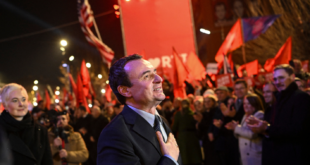Serbian and Slovenian Prime Ministers Mirko Cvetković and Borut Pahor said that relations between the two countries were good.
“Relations are friendly, political cooperation has intensified, and the economic relations of the two countries are progressing despite the crisis,” Pahor said.
He also commended the fact that one open question between the countries was closed –s the social program which is expected to take power in July.
One issue that remains between the two countries is the Slovenian property in Serbian companies, however.
Slovenian President Danilo Turk said that solving these open questions was important for improving relations between the two countries.
Asked about the decrease in value of the Serbian dinar by journalists in Ljubljana, Cvetković said that this might have come because of fears that the currently ongoing stand-by arrangement revision talks between Serbia and the IMF would be unsuccessful.
However, Cvetković said that the talks would be wrapped up successfully on Thursday and that the agreement reached between the IMF and Serbia would begin to be implemented immediately.
The Serbian prime minister also said he did not expect the domestic currency to significantly gain in value in the future, and that the exchange rate was “agreed on with the IMF” – i.e., that it would not be “created artificially”.
Cvetković also commended Slovenian investors in Serbia, stating that the none of the failed privatizations caused by the crisis have been by Slovenian companies, who continue to invest in Serbia.
Both prime ministers will be attending a business conference later in the day, at which officials from 100 Serbia and Slovenian companies will be in attendance.
Commenting on journalists’ questions related to Hague fugitive Ratko Mladić’s family wanting to legally proclaim him dead, Cvetković said that once the issue is resolved, Serbia would continue to work on arresting and extradition him to the Hague.
He also said that Mladić’s arrest is a technical question, not a political one, and that “90 percent of all services and agencies in Serbia are working on the Mladić question”.
 Eurasia Press & News
Eurasia Press & News



